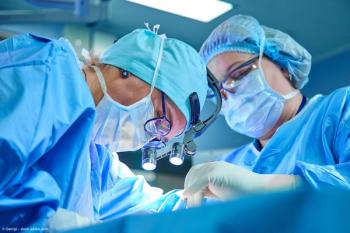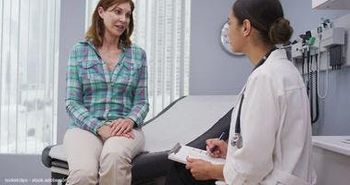
Female Urology
Latest News
Latest Videos

CME Content
More News

“Those who were on this vaginal DHEA had a huge decrease in the prevalence of urinary tract infections in the 1 year after getting the prescription,” says Rachel S. Rubin, MD.

The findings held even when the investigators adjusted for age, past medical history, smoking status, and type of surgery.

The study also found a positive correlation between burnout and discrimination-based trauma in trainees.

Patients who underwent sacrocolpopexy and were discharged on post-op day 0 had fewer instances of readmissions and fewer high-grade (class III-IV) complications.

Subscribe to get new issue email alerts for Urogynecology that include the table of contents for the publication.

"When we looked at those cumulative effects of these 3 characteristics: 65 years and older, 3 or more OAB symptoms, 4 or more comorbid conditions, the odds of screening positive were about 6-fold higher in women," says Steve R. Fisher, PhD, PT, GCS.

"About 30% of women screened positive, but of course when we looked at [the data] stratified by age, about 50% of women 65 years and older had a positive screen," says Steven R. Fisher, PhD, PT, GCS.

The courses from the American Urogynecologic Society allow urologists to earn CME credits on their own time.

This video accompanies a recently published case study of modified marsupialization for female urethral diverticula.

"If we do not see people that look like us in positions of leadership, that is not a field that we're going to want to enter," says Akanksha Mehta, MD, MS.

"We are caring for a variety of patients who do not look like the physicians who are providing care to them," says Akanksha Mehta, MD, MS.

"The [SWIU meeting] is a meeting that provides updates to all of our members about the exciting initiatives that the organization has been able to accomplish in the preceding year, as well as the initiatives that are planned for the subsequent year," says Akanksha Mehta, MD, MS.

“This fellowship was one of the first FPRMS fellowships and one of only three ever created which fully incorporated both urology and gynecology in a single training program,” said Roger Dmochowski, MD.

"I think there's going to be a rapid adoption of artificial intelligence platforms in our field," says David Sheyn, MD.

"It is a big ask of a trainee to have them sign up for a field that is demanding in terms of training, but also demanding in terms of non-professional commitments that they would otherwise make to their family life and their personal life," says Akanksha Mehta, MD, MS.

"UH is working on starting clinics throughout rural Northeast Ohio, and we're meeting to develop a FPMRS program, both virtual and in-person, so patients can have access to this point of care," says David Sheyn, MD.

"UH is working on starting clinics throughout rural Northeast Ohio, and we're meeting to develop a FPMRS program, both virtual and in-person, so patients can have access to this point of care," says David Sheyn, MD.

"Given that PCR testing may have a benefit for specific cohorts, it is recommended that more clinical evidence be provided to better guide Medicare in defining 'medical necessity,' ” write Stephanie Gleicher, MD, MPH, and Roger R. Dmochowski MD, MMHC, FACS.

Urinary tract infections (UTIs) are among the most common human infections. But the urine culture, the cornerstone for laboratory diagnosis of UTI, is imperfect.

The American Urogynecologic Society has developed the following guidelines, committee opinions, and statements to promote the highest quality patient care in FPMRS.

“I would just burn it into everyone's brain that pain with intercourse is also going to be associated with genitourinary syndrome of menopause,” says Rachel Pope, MD, MPH.

Black race was identified as an independent predictor of 30-day readmission even after investigators controlled for differences in patient demographics, clinical factors, and comorbidities.

The study considered 4 dimensions of the workplace: equal access, work-life balance, freedom from gender bias, and supportive leadership.

The patient-focused book entitled Pelvic Floor Health: Your Guide to Pregnancy and Postpartum Care is now available in paperback and e-book.

“We need to be focusing our efforts on early exposure to the field for women and underrepresented groups,” says Bridget Lang Findlay, MD.
















